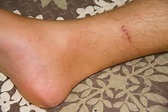





Rabid Bites and Scratches-Your Basic Travel Kit
Rabies is a viral infectio that is transmitted by the saliva of an infected animal, usually stray dogs and cats. Litle kittens popping their heads over the tops of cardboard boxes may look very sweet in the market but don't even think about touching them or going near. Licks on a small cut or open wound and licks on the mouth, nose or lips can also transmit the virus, so do make sure your children are well aware ofthe dangers. Wash thoroughly as outlined for animal bites, then apply thyme and the strongest alcohol you have. Get to the hospital as soon as possible.
FISH
Poisonous fish and marine animals carry their venom mainly in their tentacles and spines. These ca be extremely painful to extract and the risk of infection is always a problem, espically in the polluted waters.
Any visible spines should be removed and the area bathed in salt water, then apply neat thyme. For stings, wash the area in cold water and apply neat chamomile immediately.
PORTUGUESE MAN-OF-WAR
The stings are extremely painful and cause shock, cramp and vomiting. Remove any of the remaining tentacles and wash the area with whatever water you have. Then apply neat lavender all over the area and as the tissues absorb it, apply some more. When you get home wash the area with soap and water and apply chamomile, and continue applying lavender and chamomile every three hours for twenty-four hours. Keep the person warm and in bed or rested. Give plenty of warm liquids and Rescue Remedy(a homeopathic preparation that is widely available). Massage the whole body with the following oil once a day.
JELLY FISH
The small common jelly fish can give a slight sting with a reddening effect. Wash the area thoroughly as soon as you can with soap and water and apply 1 drop of chamomile or lavender oil and then ice.
SEA URCHINS
If you happen to be unlucky enough to tread on a sea urchin the most important thing is to get all the spikes out. As these are extremely brittle and break easily, do be careful about it - and make sure that whatever you use to dig them out is sterilised first. After removing all the spikes and washing the area thoroughly apply 1 drop of neat thyme every three hours, for twelve hours. If the spikes prove difficult to get out buy a Paw Paw fruit, use the inside of the skin as a poultice. The enzymes in the fruit help to dissolve the traces of spike left in the skin and also soothe the area. The pain can be treated by using equal parts of these oils.
| Chamomile | 10 Drops |
| Lavender | 10 Drops |
| Eucalyptus | 10 Drops |
| Diluted in 30mls Vegetable oil. Alternatively, use 2 drops of each - a total of 6 drops - to a teaspoon of oil. |
STING RAYS
Treat the sting as for sea urchins but apply lavender oil immediately, in addition to the thyme. The pain can be intense and last up to forty-eight hours.
BEES
Bee stings are painful and may cause fever and headaches; an allergic reaction can further cause swelling, redness and rash. Try to remove the sting and apply a cold compress of chamomile to the area. Leave it for several hours if possible but if the sting is in an awkward place just hold the compress to it for as long as possible. In both cases, apply 1 drop of neat chamomile three times a day for two days.
WASPS
Being alkaline, it helps if wasp stings are treated with cider or wine vinegar: into 1 teaspoon put 2 drops each of lavender and chamomile essential oil, mix well and dab on to the bitten area three times a day.
SPIDERS
Dilute three drops of lavender and 2 drops of chamomile essential oil in a teaspoon of alcohol. Blend well together and apply to the area three times-over one day should suffice.
THE BLACK WIDOW
Lavender oil is reputed to neutralise the poison of this very nasty spider. Apply 10 neat drops to the area every two or three minutes until you get to the hospital.
TICKS
you will only notice the tick by its swollen body attached to your skin.Do not pull it out. A cigarette placed on its body will make the tick drop off, or1 drop of thyme will also do the trick. Then apply 1 drop of neat lavender every five minutes, to a totasl of ten, to avoid infection and reduce pain and swelling.
HORNET BITES
Follow the treatment recommended for bee stings, or use lavender neat three times a day.
GNATS AND MIDGES
Dilute three drops of thyme in 1 teaspoon of cider vinegar or lemon juice and apply to the bites. This will stop the irration. s an alternative, dab on neat lavender.
BED BUGS AND FLEAS
The imoirtant factor top avoid here is the risk of infection. Bathe the bitten area aand apply neat lavender. Alternatively, dilute 3 drops of thyme in cider vinegar and apply over the bitten area. Eucalyptus is another option - use as you would lavender.
CHIGGERS AND JIGGERS
These are burrowing insects which attack mainly through the feet. They lay their eggs in burrows under the skin and also spread infection. If red lines appear up the leg or there is swelling in the lymph glands see a doctor. Add 10 drops of thyme to a teaspoon of any alcohol and apply it to the area every three hours. The next day and thereafter apply neat lavender three times a day.
SANDFLIES
Sandflies can cause phebotomus fever which usually last about three days after the bite. Apply neat lavender as soon as possible after the bite and to prevent fever massage the whole of the body twice a day for a week.
| Lavender | 10 Drops |
| Eucalyptus | 10 Drops |
| Thyme | 10 Drops |
Diluted in 30ml vegetable oil
If you cannot get a container for this quantity quickly, use 3 drops of each oil in a dessertspoon of vegetable oil.
The parasite carried by sand flies is responsible for this and for orential sore (oe Leishmaniasis) which can cause long term-ulceration of the nose and mouth with chronic illness, fevers and leisons that look like leprosy. Avoid all areas where sandflies are breeding and wear protective creams and oils wherever they are to be found.
MOSQUITOES
The area you are visiting determines the severity of a mosquito bite. Malaria is carried by the Anopheles mosquito which now lives in over one hundred countries and is emigrating to more while at the same time becoming resistant to the usual medications.
Dengue fever is a viral infection carried by another type of mosquito. It stands to reason that as several serious viral and bacterial diseases are transmitted by mosquitoes, other as yet unidentified transmissions may be taking place. As you can never know who that mosquito diving around your room, bit, before he started taking a swipe at you, it is only sensible to take all precautions possible to avoid gettng bitten yourself.
And when you put on your protective oil don't forget your face - it might be life- saving as well as face-saving!
If you have already been bitten use neat lavender oil on the bite. If you've been bitten over a large area take 1 cup of cider vinegar or the juice of two lemons and add to it 10 drops of lavender and 5 of thyme.
Put the mixture in a bath, swishing the water around before you get in. Afterwards, apply neat lavender oil to all the bites. Each night rub your body with the oil formula given for sandflies above, adding 5 drops of lemongrass to the mix.
SNAKES
Lavender has long been effectively used against the venom produced by adders in the mountainous regions of Europe, and it is about the best essential oil to use from the travel kit until you can get help.
You will want to identify the snake but do not be tempted to touch it or take any gambles in an attempt to kill it. Few people going on holiday will have read up on the local snakes, although if you have been bitten you will wish you had.
If the skin has two distinct puncture marks the odds are that it is poisonous, but if you can see small rows of teeth-marks and the skin is not punctured then you are probably lucky. In any case get help quickly.
Wash the bitten part with whatever liquid you have available - water, alcohol, Coke or essential oil if that's the only liquid you can find, anything to try and remove the poison by washing. But do not move the bitten part as this might disperse the venom. apply lavender essential oil - as much and as often as you want to - this is an emergency. Tie a bandage around leg or arm to slow down the circulation.
PLANTS
Plants contain many irritants in species such as stinging nettles, poison ivy and so forth. These can cause uriticaria - white blotch areas on the skin with raised wheals of flesh. Intense itching is also another problem. Apply soap and water as soon as possible to wash the area and then apply eucalyptus, lavender, or chamomile, either neat or on a compress. A cold compress with 2 drops of one of these essential oils often stops the irritation within a few hours.
Reference: The Fragrant Pharmacy : Valerie Anne Worwood
- Home
- Vaginal infections and inflammation
- Threat to the Forests
- The Vinegar treatment for Thrush
- Treating Acid Environments
- Your Basic Travel Kit - Tummy Troubles
- Pamela L. Crowell on the Prevention and Therapy of Cancer by Dietary Monoterpenes
- Thrush (Candida) Case History
- Problems In Pregnancy
- Thrush treatment for Men- Women
- The Work of Anne-Marie Giraud-Robert
- Fragrant Pharmacy
- Applications For Your Basic Care Kit - 4
- Whooping Cough
- Lymphoedema
- Bites and Stings - General Action - Your Basic Travel Kit
- The journey
- Your Basic Travel Kit - Fevers
- Applications For Your Basic Care Kit - 3
- Aromatherapy-Cramps
- Your Basic Travel Kit - The Heat
- Aromatherapy-Articles-A-Z
- Verrucas and Warts
- Your Basic Travel Kit
- Rabid Bites and Scratches - Your Basic Travel Kit
- Wrinkles and Ageing Skin - Facial Scrubs
- Wrinkles and Ageing Skin - Cleansers
- Wrinkles and the Ageing Skin
- Fragrant way to Beauty - 2
- The Fragrant way to Beauty
- A-Z of Dance and Sports Injuries - 7
- A-Z of Dance and Sports Injuries - 6
- A-Z of Dance and Sports Injuries - 5
- A-Z of Sports and Dance Injuries - 4
- A-Z of Sports and Dance Injuries-3
- A-Z of Sports and Dance Injuries-2
- A-Z of Sports and Dance Injuries
- Aromatherapy - Locker Room Scents
- Aromatherapy- Stress & Sports - Jacuzzis
- Aromatherapy-stress & Sport - Saunas
- Aromatherapy - stress & Sport - Showers
- Stress and Sport - Aromatherapy
- Foot Care - 2 - Aromatherapy
- Foot Care - Aromatherapy
- MUSCLES-Aromatherapy
We have 23 guests and no members online

